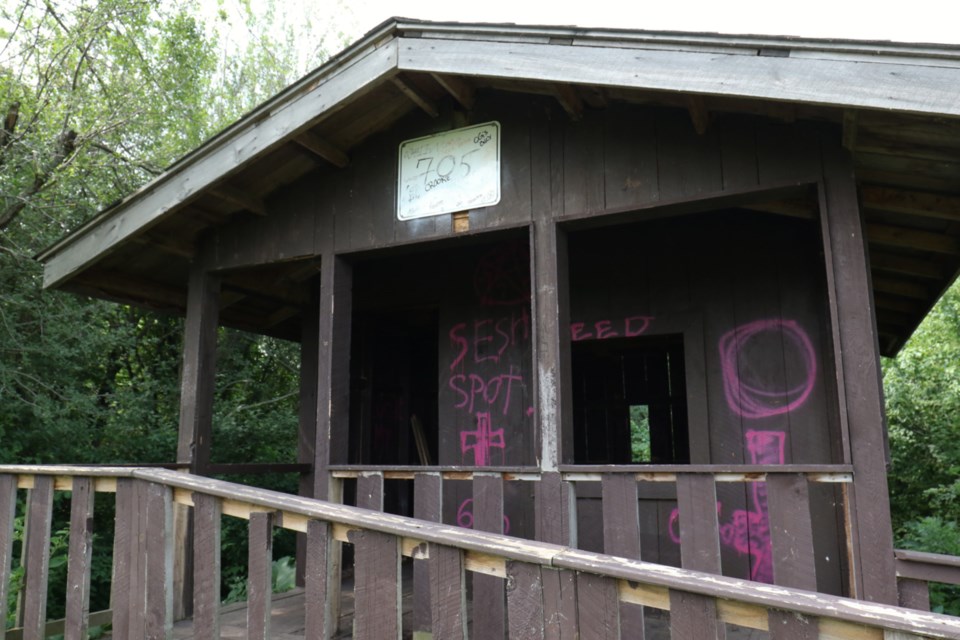Local police forces are pledging to step up their presence on Whitefish Island this summer after incidents involving overnight camping, vandalism and the discovery of drug paraphernalia caused concern for Batchewana First Nation leadership.
“We’re really struggling because all of the vandalism and the damage that’s happening on the islands,” said Batchewana First Nation Chief Dean Sayers.
Last Wednesday, the Sault Ste. Marie detachment of the Ontario Provincial Police (OPP) announced that it would be joining forces with Sault Ste. Marie Police Service, Batchewana Police Service and Parks Canada to conduct patrols on Whitefish Island.
Sault OPP Cnst. Terry Chitaroni says that concerns were brought forward by Batchewana First Nation Chief and Council after receiving complaints about loitering, vandalism and public safety issues.
“There was a meeting last summer between all community partners in regards to the concerns, and I believe that’s when the talks started and the initiative began this summer,” Chitaroni said.
The stakeholders in the island patrol project met Tuesday in order to hammer out a concrete schedule in order to ensure there’s as much police presence as possible for the rest of the summer.
For now, there’s no set date for the patrols to wrap up.
“I don’t think there’s a set date - I believe as long as the weather’s nice and people utilize the island, the focused patrols will continue,” Chitaroni said.
Meanwhile, Sault Ste. Marie Police Service spokesperson Lincoln Louttit says the patrols on Whitefish Island go hand-in-hand with its own foot patrol program - intended to get officers out of the vehicles and onto the streets - launched this past fall.
Louttit says that city police have already been walking the island to observe activity.
“It’s definitely a priority of the service to make sure that the people we serve see us in different areas of town, and they’re able to approach us and let us know what their concerns are,” Louttit said.
Vandalism, camping and drugs
Chief Sayers says there’s been many concerns when it comes to activity on Whitefish Island, and it can be seen throughout the structures along the trail system.
“People are camping, making fires right in the cabins there - burning holes in the floors, and taking boards off the walls,” Sayers said.
He also tells SooToday that staff from the Batchewana First Nation Operations Department, who go there regularly to clean up along the trails, have been finding used syringes and other drug paraphernalia.
Sayers says more planning for the protection of the First Nation’s asset is necessary at this point.
“You are going to be monitored, and there will be arrests being made,” he said.
Opening the flood gates
Sayers also tells SooToday there’s another ongoing act of vandalism taking place on Whitefish Island - the flooding of parts of the island and its trail network as a result of outflow from the compensating works gates, which is set by the International Lake Superior Board of Control.
“We have assets there, we have villages there, we’ve got history there - and we need the federal government to cease the flooding of our lands out there, and help with protecting the history, protecting the story that needs to be told,” said Sayers. “There needs to be an alternative to those compensating gates that are damaging our property just as much as the vandalizers are.”
Sayers says that Batchewana has engaged in on-and-off talks with the International Lake Superior Board of Control over the years, and that renewed talks are on the First Nation’s radar - along with “looking at a legal strategy.”
The four-phase future plan for Whitefish Island
Batchewana First Nation has always intended on seeing its four-phase plan for the island to fruition.
The first phase - trails and signage - has been completed, but the other three planned phases - involving the establishment of a pre-confederation village, interpretive centre, fish processing facility and tourist attractions - never gained traction.
Sayers wants to move talks ahead with the federal government about the remaining phases of the project, citing the cross-cultural importance of the island.
“We don’t have the ability to spend a lot of our energies on that, because we’re just continually putting out physical fires, covering up vandalism, our staff going through [Whitefish Island] picking up needles and drug paraphernalia,” Sayers said.
Batchewana First Nation reclaimed ownership of Whitefish Island in 1992 following a land claims settlement with the federal government, but took another five years before the island became part of the lands reserved in trust for the community.
